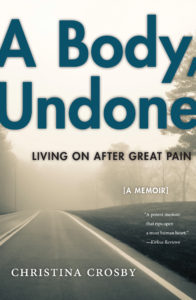
Christina Crosby, A Body, Undone: Living On After Great Pain. NYU Press, 2016.
Reviewed by Ayesha Ahmad
There is a paradox in Professor Christina Crosby’s biography A Body, Undone: Living On After Great Pain–the paralysis that constrained her body so suddenly seems to have freed the language that we all possess and contain but which is generally consigned to a particular place in space and time.
Details about Crosby’s accident are astute, acute, and actual—there is no reflection, reliving or ruminating. The scene shared is that of Crosby on a cycling ride. Three miles into the 17 mile bicycle ride that was woven into a larger tapestry of 1000 miles to commemorate her 50th birthday, the fateful accident occurred. The journey stopped being a physical endeavour, instead reaching plateaus and crevices that became Crosby’s new lived experience.
The book requires the reader to become a traveller. We must leave the comfort of our previously held thoughts and beliefs. We must accept that we can no longer look behind at our past. We must embrace the fact that we are now in a new territory. We need new concepts, new identities and new sensations to experience the life that we are continue to breathe. We know that we are living in a new dimension—a different time and space to where we once walked and talked and wrote and sang, and celebrated our stories. As Crosby writes:
“Your body has and is a history” (p. 50)
This history becomes a vacuum. Crosby’s accident shows the fragility of life, and also reveals how our lives can be filled endlessly with triumphs and tragedies, and that these events can happen in any order, at any time, and at any cost. This is the vulnerability of our lives that Crosby sees as signifying our incompleteness. The way we treat our vulnerability, then, is a marker of how we find our completeness.
A Body, Undone spoke to me. Crosby’s resonated with me as her words created echoes and magnified the dusty corners where I have been living within myself. Her words helped me to regain a sense of living. I experienced a transcendence while reading the book. A Body, Undone is not a book about paralysis, about the loss of feeling, the inability to feel physical pain. Instead, it is about the body transformed. As is clearly evident throughout the narrative, it is Crosby’s masterful skill of language that navigated this transformation. Her voice resonates in the observation that:
“We speak of being in a body, as though the self were somehow contained inside a bodily exterior” (p. 50).
The body became “undone”, yet language became complete as Crosby discovered, through the paradox of the paralysis of the body, what it means to truly experience the vulnerability of being human. She takes us to the chasm of our essence.
Finally, I present the following, a nuance on the binaries we are forced into during life. Crosby writes:
“I’m afraid I’ll stop grieving and equally afraid that I’ll never stop grieving. If I do stop grieving, I will necessarily have come to terms with my profoundly changed body and my profoundly changed life, for I can leave off mourning only by no longer cherishing and burnishing my memories of the past” (p.197).
Crosby’s book gives us a gift—that of freedom, freedom to traverse the limitations we set forth for ourselves and to use our story to become whoever we are or wish to be.